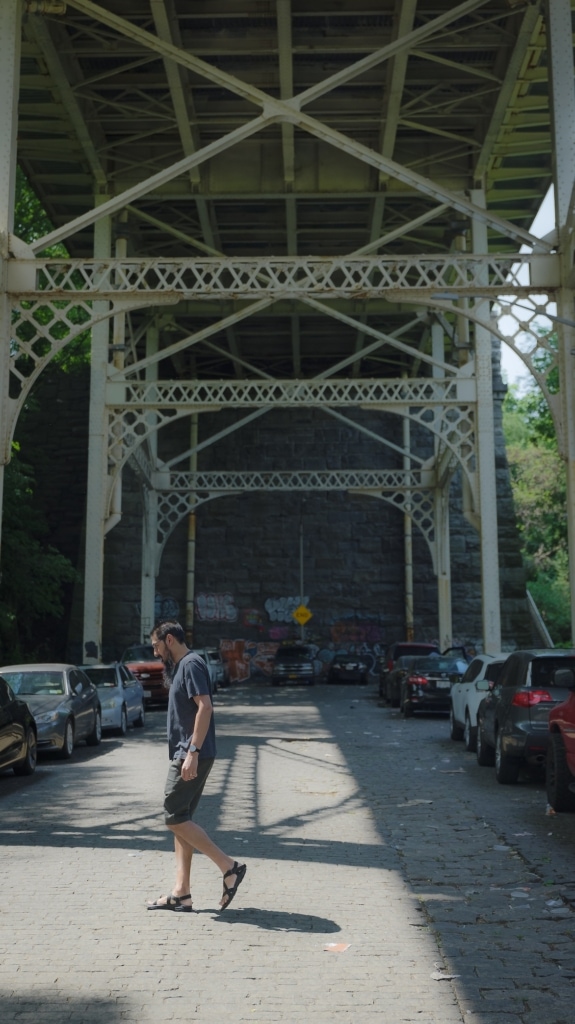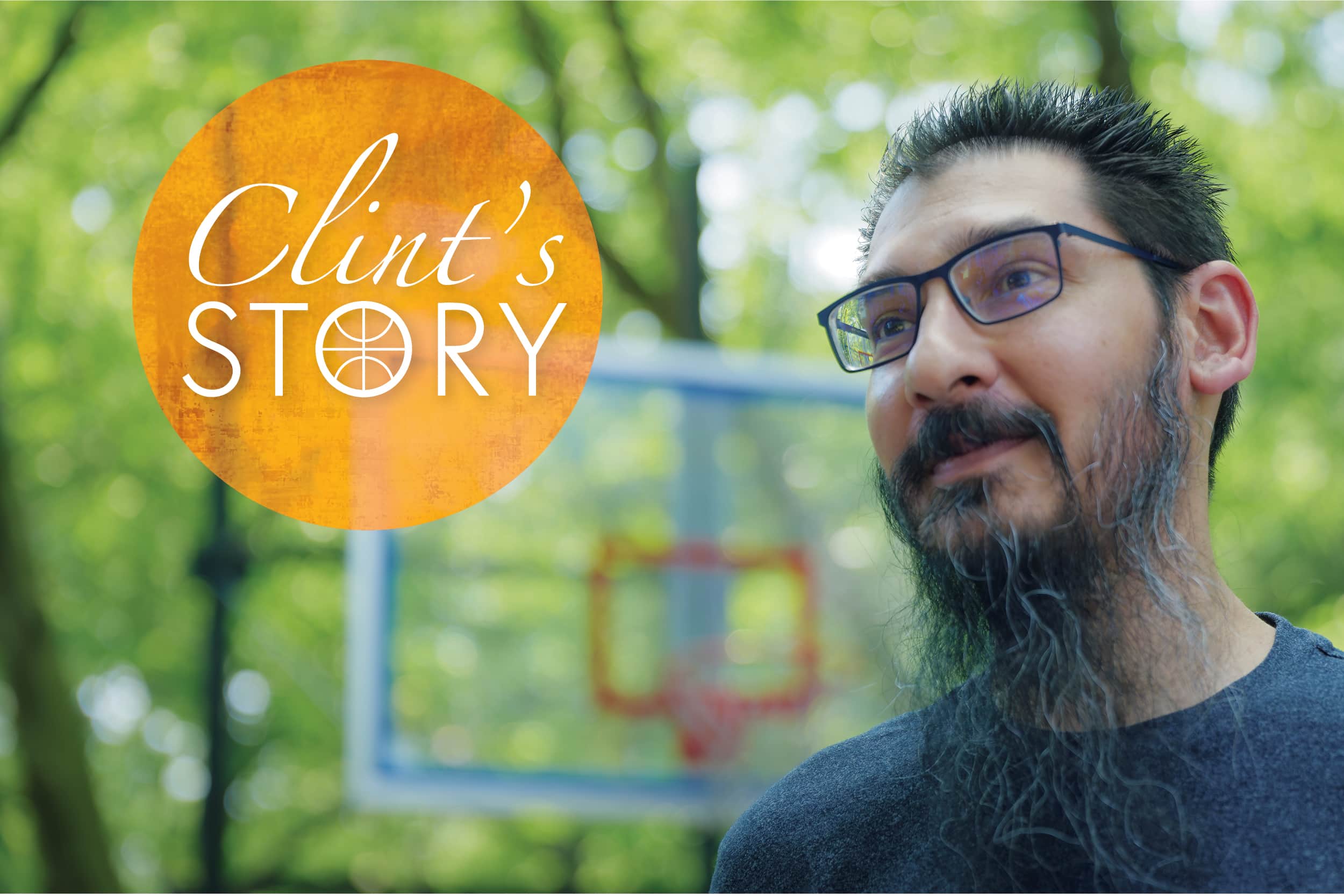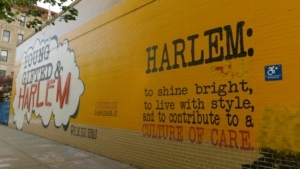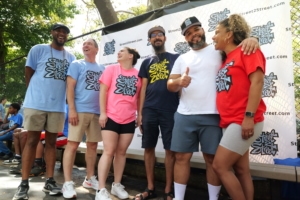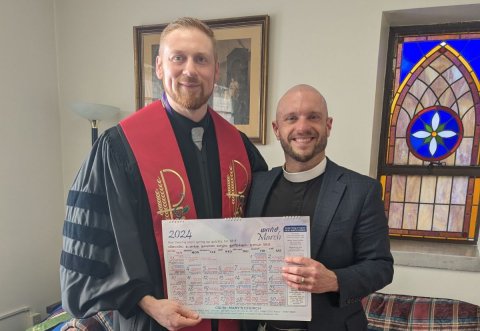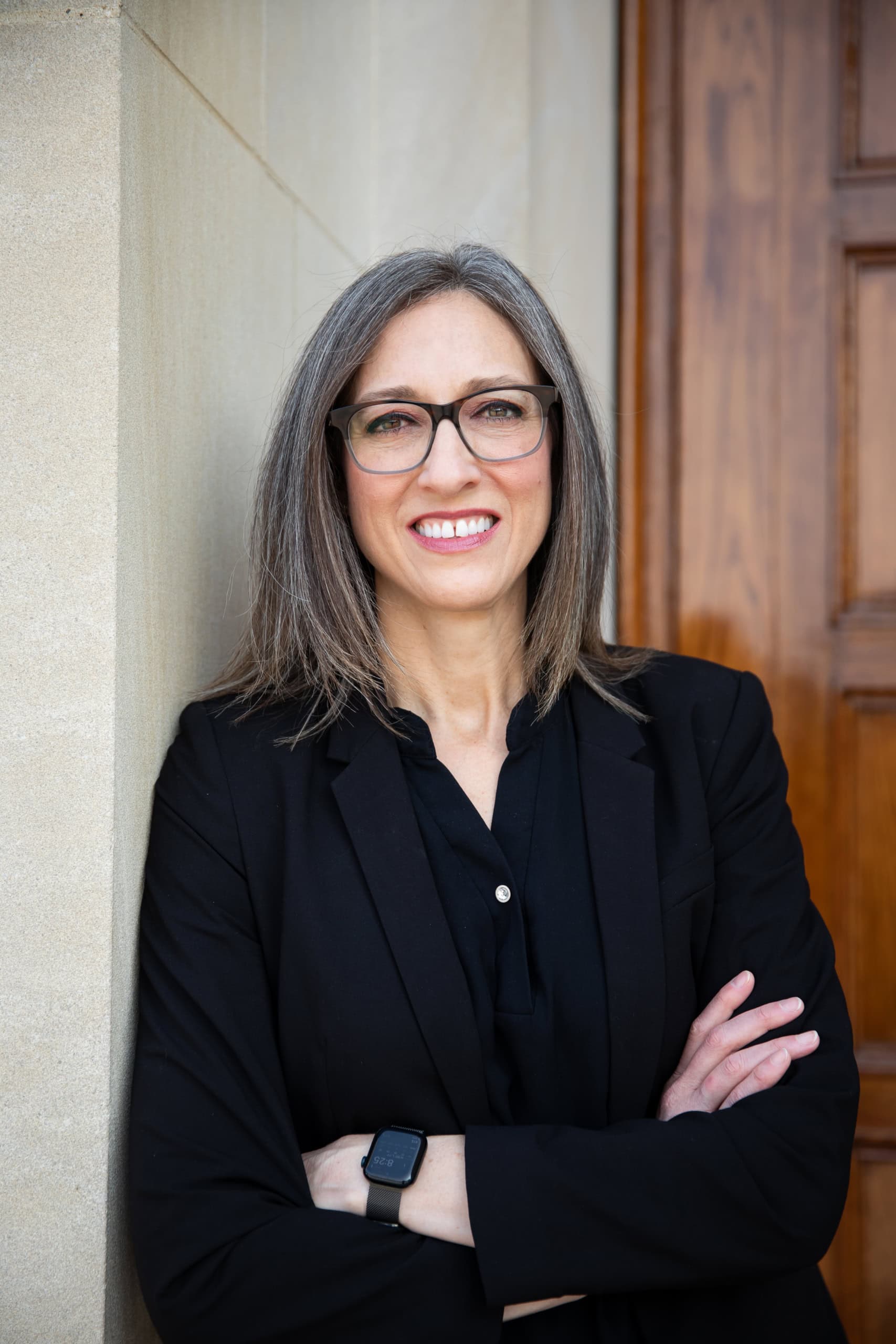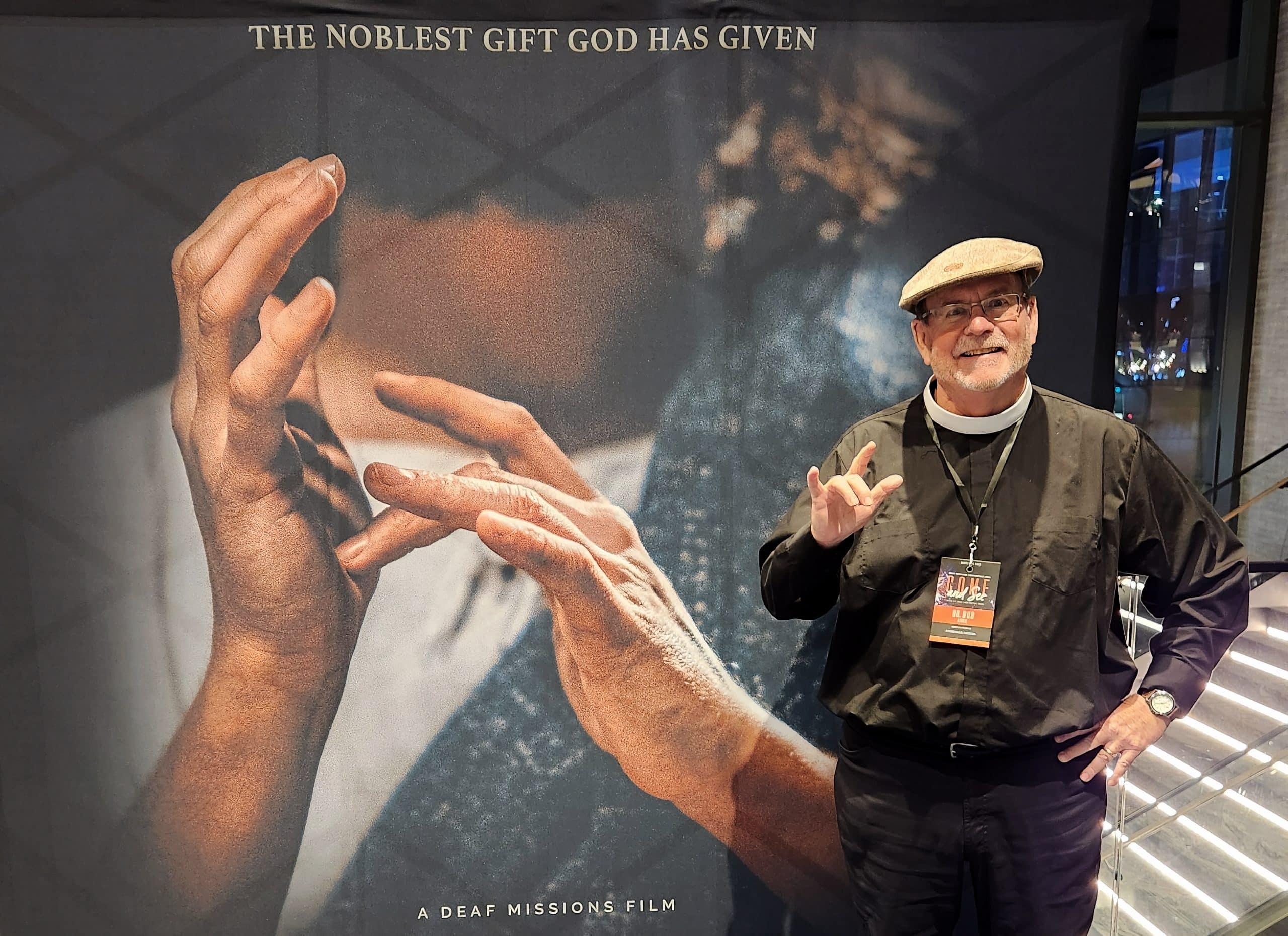Watch the whole Clint story here.
This video trailer will give you a brief taste of his story.
On the streets of New York City, where wildly diverse ethnic and religious groups rub shoulders, one could be forgiven for mistakenly thinking Clint, with his foot long, thin, black and grey beard, is a part of a Hasidic Jewish group or an Eastern Orthodox church. But he is a priest and church administrator at Emanuel Anglican Church (Diocese of the Living Word) and the NYC Program Manager for Street2Street, an organization that serves high-risk youth in the New York/New Jersey area. He was raised in Canada, his mother is Trinidadian/Tobagan of Indian descent, and his father is Slovakian/Ukrainian.
“I’m not like a super athletic guy…but I like hockey.” This would not be the only quirky and ironic facet in Clint’s story.

Also in 2005, Clint was living in a Christian community house they called, “The Harlem House.” He met his future wife while living there and their family now lives in the same neighborhood, less than a block away from Harlem House. Clint followed his wife to a small Anglican church in Union Square and worked in an internship program there along with the Street2Street ministry.
But as Street2Street grew, they were increasingly confronted by the challenge of connecting the kids into the community churches. The churches reached out to the ministry leaders, asking them if they had resources and training for how to study the Bible with the kids. Increasingly, Clint felt the personal need for more training and decided to attend Regent College in Vancouver, British Columbia.
While he was there, Clint was fortunate enough to study under the renowned Anglican theologian, Dr. J.I. Packer. He and a few students would meet regularly with Dr. Packer for one hour. The running joke was to see who could get the most questions asked in that amount of time; apparently, Dr. Packer was known for being “Master of the Preface” and this significantly limited the number of questions that could be asked during that timeframe. His fondest memory of Dr. Packer was encountering him on the bus as he was traveling home from campus. Clint happened to be listening to a definitive hip-hop album on his headphones as the two of them struck up a normal, “How is your day, and how are your studies?” type of conversation.
The whole scene struck Clint as surreal, “the kind of absurdity of being on a bus, talking to J.I. Packer, while listening to hip-hop.”
Clint ended up doing a seminar on St. Gregory of Nyssa (335-394), which led him to focus on Gregory and slavery for his Anglican Studies project. “Gregory was one of the dissenting voices in the early church and was vehemently anti-slavery,” said Clint. On the heels of this study and his return to New York City, Clint learned more about his family background. He discovered that on his mother’s side, they were indentured servants/slaves brought from India to work on the islands. He began to learn about generational trauma and its effects on him. The confluence of his studies and readings opened a window into his family history that he did not know, “…but also into myself and a lot of my own spiritual struggles; a lot of the quirks about me that I was wrestling with that I didn’t really know.”
A quote from Jim Houston, founder of Regent College, impacted Clint: “God leads us into the deserts of our own addiction, and if we stay there long enough, it will become a well of living water.” Clint explained, “What he was getting at was that following God will lead you into these desert spaces, the places you don’t really want to go, and the places that are not comfortable. They’re dry places. But if you stay there long enough, that’s how God heals you.” Clint now sees how God worked in him through the processing and pain of his family’s history to prepare him for ministry in Harlem and New York City. There are a lot of Caribbean communities around the city who share a similar heritage to Clint so he found that this time of wrestling has helped him to better empathize with them.
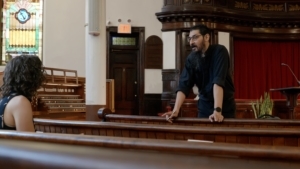 After Regent, Clint returned to New York City – though not Harlem – becoming a deacon at Emanuel Anglican. But then he had an encounter in which he was brought through a place of pain, and unexpectedly, a confirmation of his ministry.
After Regent, Clint returned to New York City – though not Harlem – becoming a deacon at Emanuel Anglican. But then he had an encounter in which he was brought through a place of pain, and unexpectedly, a confirmation of his ministry.
On a beautiful spring day, Clint walked through an area he considered one of the safest neighborhoods in Harlem. He was scouting out a few basketball courts for future tournaments. He walked by what he characterized as a group of “kids” and the next thing he knew they jumped him from behind, hit him, and knocked him to the ground. “They were trying to get my wallet and I instinctively fought back and yelled enough to scare them away from me.” He had been beaten up enough that when his wife found him, they called an ambulance. He had been concussed.
The next day he processed the whole assault with a good friend who had worked with him through his recent trials. As he replayed the whole incident and then prayed through it, he recounts, “I was overwhelmed with a sense of compassion or pity, I don’t know really…it was like, wow, what are these kids up to that this is what they are doing? There was this sense of, ‘How do we reach these kids if this is the kind of thing they are doing at 3:00 in the afternoon?’” As he relived the assault, he recalled that,
“It was probably the most powerful experience of the presence of God, in the midst of being assaulted – this sense of Jesus speaking to me that He’s with me no matter what.”
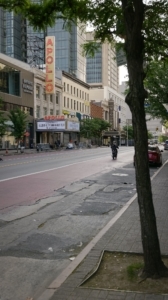
“But there was a sense of a calling back to the neighborhood, calling us back to Harlem. So, I know it sounds really weird. It sounds counterintuitive, God calling us back to this neighborhood.”
After the incident, they decided to move back to Harlem because they thought, “…God’s preparing us for what’s next, and he’s going to be with us no matter what.”
The next unexpected turn for Clint and the world was COVID – while still dealing with post-concussion symptoms. The Street2Street ministry and the entire city was frozen. His wife’s teaching, his daughter’s learning, and his management of the program and church all took place in an already-cramped, 4th floor apartment in Harlem. Street2Street ended up working with kids in online video basketball game tournaments to stay connected, but the effects of COVID’s forced stoppage and his own physical and mental processing of the assault led him to reimagine the ministry of Street2Street.
Clint noted Zechariah 8:5 as their touchstone, “The city streets will be filled with boys and girls playing there.”
He saw this as an image of peace, of what it looks like when God’s people are dwelling in the new heaven and the new earth where they are no longer worried about violence or going hungry. 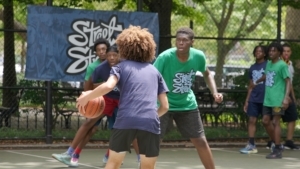 As Christians, Clint felt we should bear witness to that coming reality in the streets of Harlem, Brooklyn, and New Jersey. He began to build more community relationships and presence by joining his precinct’s Clergy Council and drawing in more churches and organizations for big events. In New Jersey, they now have a weekly presence with a basketball league, tutoring, and after school programs. He sees Street2Street as a beachhead in the community so that the young people can begin to fl ourish. As a priest, he found those opportunities were not necessarily open to him, but he found that through Street2Street he is better able to connect with the community, understand their needs, and how to best help them thrive.
As Christians, Clint felt we should bear witness to that coming reality in the streets of Harlem, Brooklyn, and New Jersey. He began to build more community relationships and presence by joining his precinct’s Clergy Council and drawing in more churches and organizations for big events. In New Jersey, they now have a weekly presence with a basketball league, tutoring, and after school programs. He sees Street2Street as a beachhead in the community so that the young people can begin to fl ourish. As a priest, he found those opportunities were not necessarily open to him, but he found that through Street2Street he is better able to connect with the community, understand their needs, and how to best help them thrive.
He recalls an experience in one tournament where a team registered as “RIP Jason”, which he thought was odd. As the tournament progressed, he got to talking with the players, who were from the Bronx which is across the river from Harlem, and they shared with him the reason behind the name. They had named it in honor of their friend Jason who had been stabbed and killed two nights before the tournament registration. They were playing for him. The guys went on to run the table and win the tournament, so they followed Street2Street around to play in the rest of the tournaments that summer. Through the tournaments, Street2Street leadership was able to connect with the players and build relationships with them. Through these relationships, the leaders can help connect the young men to churches in their communities so that they can be discipled.
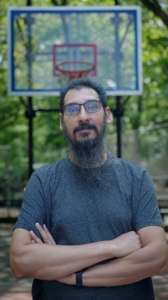 When asked about how his physical appearance and ethnic background have affected his ability to connect with New York City young people, Clint answered by first expounding on the nature of Harlem’s story and ethnic makeup. Harlem, he notes, was originally settled by the Dutch, named after Haarlem in the Netherlands. Many ethnic groups, including Jewish, Italian, Irish, and German, populated it early on. Then it became an African-American hub, a community which still exists there. Now, it’s hugely diverse with also a lot of Dominicans (Dominican Republic origin) and Puerto Ricans on his block. “You can walk down the street and hear six different languages and all kinds of people, but gentrification has been creeping up into Harlem and so there’s tensions with white people living here. For myself, being a multi-ethnic person, I can walk between different cultures, yet in some ways never fully be at home in any one culture. So, as I am walking in a place like Harlem, different people will respond to me in different ways. I’ve just learned to be awkward. It’s going to be awkward, but it doesn’t really matter who I’m with, there’s going to be ways to connect with different people.”
When asked about how his physical appearance and ethnic background have affected his ability to connect with New York City young people, Clint answered by first expounding on the nature of Harlem’s story and ethnic makeup. Harlem, he notes, was originally settled by the Dutch, named after Haarlem in the Netherlands. Many ethnic groups, including Jewish, Italian, Irish, and German, populated it early on. Then it became an African-American hub, a community which still exists there. Now, it’s hugely diverse with also a lot of Dominicans (Dominican Republic origin) and Puerto Ricans on his block. “You can walk down the street and hear six different languages and all kinds of people, but gentrification has been creeping up into Harlem and so there’s tensions with white people living here. For myself, being a multi-ethnic person, I can walk between different cultures, yet in some ways never fully be at home in any one culture. So, as I am walking in a place like Harlem, different people will respond to me in different ways. I’ve just learned to be awkward. It’s going to be awkward, but it doesn’t really matter who I’m with, there’s going to be ways to connect with different people.”
However, since Clint has been working through his ancestry, he has also worked through the reality of finding his identity in Christ.
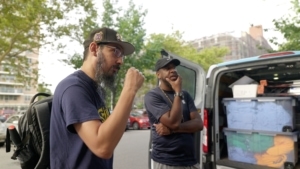
“As I have been able to be anchored more robustly in Christ, I have also been able to be freed to value my ethnic background. It allows me to connect with people from different cultures.”
He works with a lot of kids for whom New York City is a second culture. He has found he is able to identify with them in the struggles they face, including racism, as they adapt to their present culture while retaining the part of them that comes from somewhere else.
After COVID and the concussion trauma, Clint has experienced a bit of a springtime in life and ministry. He has been ordained and has witnessed the joy of seeing Emanuel Anglican in the West Village become somewhat of a magnet church drawing people from all over the city. At Emanuel, they are ministering to people from everywhere, both internationally and from different parts of the New York City area. It appears that God has uniquely equipped Clint to work through the awkwardness that sometimes accompanies this mix of cultures and interactions. “There’s real growth when you can wade into those spaces and kind of push to deal with these things [differences], or we need to at least say the things that nobody really wants to talk about.” This has moved Clint and others to start discerning what a church plant would look like in places like Harlem. For now, though, Clint waits expectantly, perhaps even awkwardly, for the unexpected from God in this unique place and time in New York City.
It’s a steamy, July morning in Brooklyn and a van wrapped dynamically with Street2Street graphics is parked by a basketball court; volunteers are pulling tables, tents, and paraphernalia out of it to set up for the basketball tournament. Clint and the Street2Street program director, Andre Rousseau, are assigning tasks to volunteers. In high school, Andre wanted to be an NBA player, which did not work out, but his backup plan was to work in basketball, work with students, and be able to share the gospel. “Those were always my three things,” he said. After volunteering and coaching in Patterson, NJ in basketball, he felt God calling him to work in mentorship opportunities that Street2Street provides. “One of the best things about today is I have one of my ex-students and ex-players who’s helping and volunteering here today. The fact that they go on to get an education, that’s great. The fact that they’re good basketball players, that is great. But the fact that they’re better people and they know the Lord, that’s the best part.”
When asked about working with Clint, Andre chuckles and gives a broad grin, “Clint is the funniest guy in the world. He wouldn’t call himself a basketball guy, but he has a heart for kids and he’s been around longer than any other staff member.” Andre also thinks of Clint as one of the more humble guys he knows but he recalled how at a Street2Street Staten Island event back in the early days, Clint rose to the occasion in front of a surprisingly large crowd of 250 kids. The assertive, loud side of Clint came out. “I saw a side of Clint I’ve never seen before, he wasn’t angry, but he was here and was getting the kids ready. It was encouraging to see the outgoing and loud version of Clint. He’s like an onion, you keep peeling back the layers…but he has a lot of depth to him.”
President and founder of Street2Street, Woody Woodfin, was pushing a broom on the courts much of the morning to get them cleaned up for the tournament. Woody talked about the early days with Clint when the ministry got started, “Older people may get this reference, but we looked like Starsky and Hutch walking around neighborhoods. We looked like a couple of cops walking around. No one wanted to talk to us.” Woody, a white southerner from Chattanooga, Tennessee, and bearded Clint from Canada were simply connecting with kids through the medium of basketball. In the early days, in the neighborhoods that Woody and Clint were working in, there were no programs connecting with kids. The secret sauce in Street2Street’s ministry, as Woody tells it, has been the staff and volunteers who joined the team who lived in the neighborhoods or were from them.
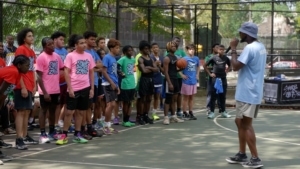 In addition to the summer heat in Brooklyn, the pulsing hip-hop music was getting heated up as kids were having to raise their voice to share their registration information with staff and volunteers, like Rebecca and Chino Arborleda. Both grew up in the neighborhood where the tournament was being hosted. “I’m a baseball guy but basketball is the language of the street. Through the sport of basketball I came back to serve my community and just help kids understand that, you know, that Jesus is for them and they can find so much love and kindness just right here on the basketball court.”
In addition to the summer heat in Brooklyn, the pulsing hip-hop music was getting heated up as kids were having to raise their voice to share their registration information with staff and volunteers, like Rebecca and Chino Arborleda. Both grew up in the neighborhood where the tournament was being hosted. “I’m a baseball guy but basketball is the language of the street. Through the sport of basketball I came back to serve my community and just help kids understand that, you know, that Jesus is for them and they can find so much love and kindness just right here on the basketball court.” 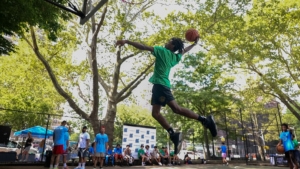 The music was briefly turned down as the Street2Street team gathered all of the roughly 125 participants to explain how the tournament would work, the rules of the court, and to introduce the referees. The scene was a mix of ethnicities ranging from teenagers with Asian and Puerto Rican backgrounds to African-Americans. Then, Chino introduced a friend who smoothly transitioned to sharing the gospel in a natural manner that appeared to be well received by the players. Heads bowed and the offer of repentance and following Jesus was given as they prayed together—a holy moment as the sweltering humidity and city noise all took a backseat.
The music was briefly turned down as the Street2Street team gathered all of the roughly 125 participants to explain how the tournament would work, the rules of the court, and to introduce the referees. The scene was a mix of ethnicities ranging from teenagers with Asian and Puerto Rican backgrounds to African-Americans. Then, Chino introduced a friend who smoothly transitioned to sharing the gospel in a natural manner that appeared to be well received by the players. Heads bowed and the offer of repentance and following Jesus was given as they prayed together—a holy moment as the sweltering humidity and city noise all took a backseat.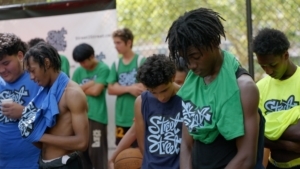
A table by the courts was filled with impressive trophies for the winners of the different age groups; one of the trophies was even a “character award” given to the player with the best sportsmanship. One of the younger participants was circling the table, eyeing the trophies and asked, “If a team wins their age group, do all the players get a trophy? I mean, like, all of us on the team?” Of course, the answer was yes, but the Street2Street program appears to be bringing trophies of eternal significance to these NYC kids. One of the staff members, Alison Woodfin explained, “These kids were born and raised here in the middle of NYC and yet many have not had access to the gospel.
Of course, the answer was yes, but the Street2Street program appears to be bringing trophies of eternal significance to these NYC kids. One of the staff members, Alison Woodfin explained, “These kids were born and raised here in the middle of NYC and yet many have not had access to the gospel.
One Muslim boy recently asked me, ‘So this Jesus, what do you think about forgiveness? Do you really believe that?’”
Alison was able to openly share the gospel with this boy in response to his excellent question. These are the opportunities of open questions and relationships that lead to discipleship and the gospel taking root in neighborhoods across New York City and the surrounding area, a taste of Clint and Zechariah’s vision where people are dwelling in the new heaven and the new earth in peace.